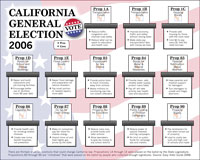Students debate two key ballot propositions
 By Maria Miranda & Joe Johnson By Maria Miranda & Joe Johnson
The Collegian
Long locked out of power, Democrats appear poised to win control of the House and possibly the Senate in midterm elections this week amid a national clamor for change after four years of war in Iraq.
Democrats also are on track to replace Republican governors in several states, New York, Ohio and Massachusetts among them. Republican Gov. Arnold Schwarzenegger seems safely on his way to a first full term in California, the most populous state.
Six years after President Bush took office and with his poll ratings at no better than 40 percent, all 435 House seats are on the ballot, as well as 33 Senate and 36 gubernatorial races. Voters in 37 states settled the fate of ballot initiatives, deciding whether to raise the minimum wage, ban gay marriage, endorse expanded embryonic stem cell research and in South Dakota impose the country's most stringent abortion restrictions.
State legislative and local races by the thousands filled out the ballots in nearly every county.
The elections counted as the costliest ever, with spending expected to reach $2.6 billion, much of it paying for caustic television commercials.
Candidates everywhere worked through a final weekend of campaigning, sometimes with little or no rest. Claire McCaskill, the Democratic senatorial candidate in Missouri, was on a 30-stop tour over 24 uninterrupted hours. “It's the last person you expect to see at Waffle House at 3 a.m.,” said Tim Yazawa, 24, who was grabbing a middle-of-the night bite to eat when her entourage rolled in.
Republicans are counting on their get-out-the-vote operation and a late save-the-majority tour by Bush to limit their losses. “The last thing American families and small businesses need now is a higher tax bill,” he said Saturday in a weekly radio address broadcast live from Englewood, Colo. “And that is what you'll get if the Democrats take control of the Congress.”
But Democrats sought to capitalize on weariness about the war, which has cost more than 2,800 U.S. troops their lives.
A dozen years after Republicans gained power in a landslide, strategists in both parties as well as public and private polls say Democrats are on the cusp of taking it back.
Democrats must gain 15 seats to make Rep. Nancy Pelosi of California the first woman speaker in history, and national surveys showed Democrats running ahead of Republicans in hypothetical ballot tests on a scope not seen since 1990. In a late October Associated Press-AOL News poll, 56 percent of likely voters sided with Democrats and 37 percent with Republicans. The 19 percentage-point gap was nearly double the 10-point spread in a survey a few weeks earlier.
At the same time, the poll suggested that not everyone's mind was fully made up far from it. About 38 percent of likely voters said they either had not made a final decision or could change their intentions before casting their ballots.
Still, among Republicans and Democrats alike, there was open speculation about the size of the majority the Democrats would command.
“A miracle day for us would be 14 seats lost,” said Joe Gaylord, who was the chief strategist for Newt Gingrich in 1994 when Republicans swept to power. “A good day would be around minus 20, and a bad day would be over 30.”
He said dissatisfaction was evident with the Republican job performance among all parts of the GOP coalition, social conservatives, economic conservatives and foreign policy conservatives.
Democrats shunned ebullient predictions, recalling false optimism of previous elections. But several strategists said this time was different. In the past, “we were trying to contrive a message of change, and so we would lose. This time, the political environment held from January through November,” said John Anzalone, a Democratic pollster advising Sheldon Whitehouse, favored to win a Senate race in Rhode Island, as well as numerous House contenders in close races.
“I've said all along there's going to be three dozen very hotly contested seats,” said Rep. Tom Reynolds, R-N.Y., chairman of the House campaign committee, who noted that he has said for months that Republicans have campaigned all year with “the wind in our face.”
Based on polling and the record sums the House GOP committee and its Democratic counterpart have spent on advertising, the list of competitive races far exceeds three-dozen.
Three days before the ballots are cast, Republicans all but conceded six seats or more are lost to the Democrats.
The struggle for the Senate, where Democrats need to gain six seats for control, seemed less predictable. “I'm both feeling good and nervous,” said Sen. Chuck Schumer of New York, head of the Democratic campaign organization. “I wouldn't say we're going to take back the Senate and I wouldn't say we're not.”
In marquee gubernatorial races, Schwarzenegger's opponent, Phil Angelides, had trouble gaining traction from the start, and the Republican appears headed for four more years in office.
Comment on this story in the News forum >>
|

